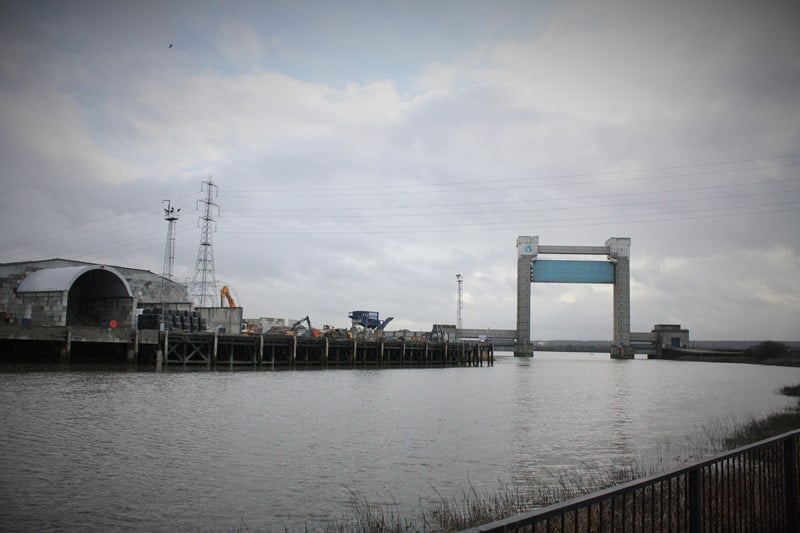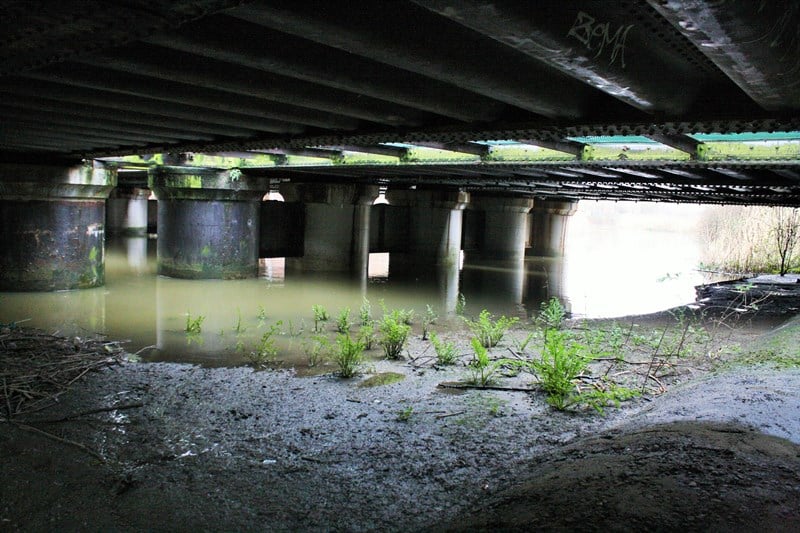This Far East: Beckton and Barking
/By Gary Budden:
We pull up into a deserted carpark by the Showcase cinema, by the saddest Frankie & Bennys I’ve ever seen. Star Wars, The Hateful Eight and Bollywood films I don’t know are screening.
We head onto the path, flanking the Beckton sewage treatment works on our right. There’s the smell of damp concrete, something sour, flowing water. Not a soul to be seen, yet here we are, in London. Even the walls here show no human life, free of graffiti and tags.
The flood barrier comes into view, by a refuse-disposal site where black-headed gulls flock and machines roar. It’s a sci-fi edifice, little known and colossal. I wonder if it’s been use with the recent rains, or has ever been in use. It looks like the gate to a sunken and forgotten city.
Where Barking Creek meets the Thames I wish I’d bought my binoculars. The river never fails to inspire and this far east it can take the breath away with its sheer size. The opposite shore is a world away.
Twenty turnstones or more skim over the water. Demonic cormorants pose like black statues on the concrete. Gulls bob on the river surrounding tugs weighed down with the city’s waste. I’m amazed to see a black tailed godwit take flight perhaps a hundred metres from where we stand and I start to take photos. Then an orange-jacket man walks up to the fence of the treatment works, look at us and walk back. I imagine he’s bored.
We have to double back. There’s a hoppable padlocked gate into the tiny nature reserve. We hop it and walk through sibilant reeds watching rabbits break cover at our approach. Still no other walkers seen. A new tree-planting scheme has begun, and I wonder if this is why the gates for this public space are locked.
We hop the other gate and head along the River Roding into Barking. FUCK OFF TO ALL FORIGNERS screams the graffiti. New developments, the wooden remains of a boat half-submerged. I read the signs on the window of a new empty block. Creative arts spaces for rent provided by Bow Arts. You can feel which way the tide is going.
The Roding is muddy water and the familiar detritus of crumpled beer cans, discarded underwear and puddled shit. But I’m happy to see gorse bushes, still in bright-yellow flower, a plant I associate with the flatlands of East Anglia.
We visit the ruins of Barking Abbey and the newer church. The abbey has Anglo-Saxon origin (names like Ethelburga in the information signs). It was dissolved come Henry VIII. Carved skulls adorn certain graves, mossy and weather-beaten. In the distance are red buses and pound shops, London going about its business.
Back to the river. We follow a dead-end path, over a wall into a mess of bramble and trampled razor wire, crawl under the railway bridge to where the river is breaking its banks and green plants grow in the murky half-light.
Like trolls, we wait, filming the trains as they pass. What would the passing traveller think if they saw us?
Walking back the way we came, a bird of prey breaks cover from the trees above but I can’t identify it in this weak January light.
We come across a Tesco with a Costa attached. Coffee break.
As we sip in the carpark, I think how unknowable this city is and after over a decade here, I’m still just beginning.
Gary Budden is the co-director of Influx Press and editorial assistant at Unsung Stories. His work has appeared in Structo, Unthology, The Lonely Crowd, Gorse, Galley Beggar Press and many more. He writes regularly for Unofficial Britain and blogs about landscape punk at New Lexicons. Gary’s essay on Romney Marsh appeared in Elsewhere No.01.
Watch a film of this journey, and beyond to Gallion's Reach, by Martin Fuller.




